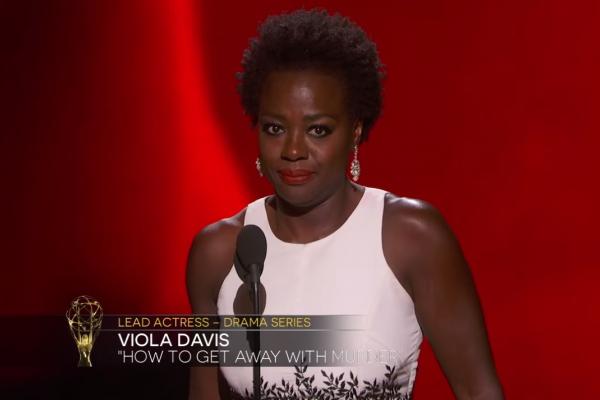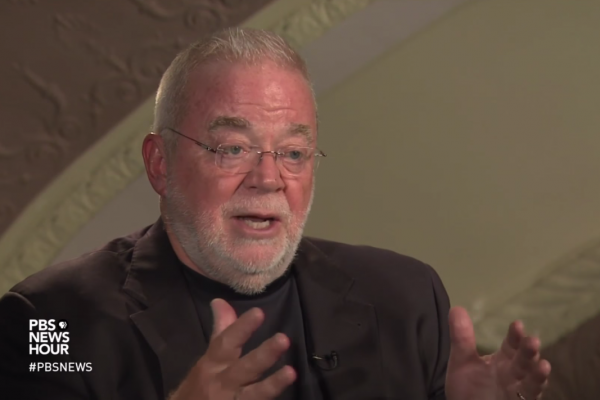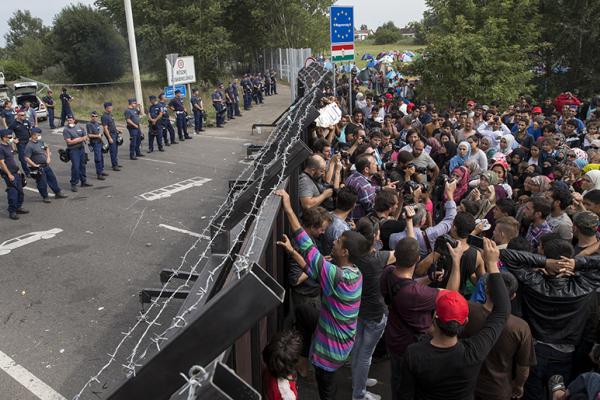Viola Davis became the first black woman to win an Emmy for best actress in a drama at the 67th Emmy Awards on Sunday night.
Davis won the award for her role in How to Get Away with Murder, in which she plays Annalise Keating, a brilliant criminal defense professor.
In her stirring acceptance speech, Davis spoke about the difficulties women of color have often faced getting lead roles.
Viola Davis became the first black woman to win an Emmy for best actress in a drama at the 67th Emmy Awards on Sunday night.
Davis won the award for her role in How to Get Away with Murder, in which she plays Annalise Keating, a brilliant criminal defense professor.
In her stirring acceptance speech, Davis spoke about the difficulties women of color have often faced getting lead roles.
Viola Davis became the first black woman to win an Emmy for best actress in a drama at the 67th Emmy Awards on Sunday night.
Davis won the award for her role in How to Get Away with Murder, in which she plays Annalise Keating, a brilliant criminal defense professor.
In her stirring acceptance speech, Davis spoke about the difficulties women of color have often faced getting lead roles.
Restoring the Bible to the heart of the Anglican Communion should be the goal of a meeting called this week by Archbishop of Canterbury Justin Welby on how Anglicans should move forward, said the head of the Global Anglican Future Conference.
Welby’s meeting of Anglican leaders is planned for mid-January 2016 in Canterbury, England. It is being viewed as an attempt to heal the 80 million-member communion, which remains deeply wounded by disputes over homosexuality and women’s ordination in the global church.
GAFCON’s chairman, Archbishop Eliud Wabukala, the primate of Kenya, said the meeting was a recognition of the deep concerns of the faithful Anglican Church leaders in the world. GAFCON, started in 2008 in Jerusalem, says its aim is to restore the integrity of the Anglican faith and order.
Fort Worth, Texas, native Amneh Jafari never expected to help spark an international movement.
But when the senior University of Texas Arlington psychology major saw a picture on the news showing Irving teen Ahmed Mohamed in handcuffs for bringing a homemade clock to MacArthur High School, it felt personal.
“It really saddened me,” Jafari said.
“I have younger siblings, and I felt like I was looking at them.”
On my way home from working at the Little League World Series in South Williamsport, Pa., I decided to do something that I’ve dreamed about for many years.
I would visit the lake.
There’s a lake just west of Youngstown, Ohio, that’s been special to me since I was about seven years old. It’s called Lake Milton. I don’t know the story behind how it got its name. But I can share my story of why it’s special.
Some of my friends know that my dad was an alcoholic. He didn’t drink every day, but when he did, he couldn’t stop. And he’d get loud and angry and abusive toward my mom. It was awful and frightening. I remember listening to the arguments and shaking uncontrollably. This went on for several years.
Fortunately, my dad eventually recognized he needed help and joined Alcoholics Anonymous. His sponsor was a funny, kind man named John. He became part of the family — we called him Uncle John. He and his wife, Fran, owned a cottage by Lake Milton. They encouraged us to use it for a week each summer.
Pope Francis is not an innovator in his approach to the topic of nuclear weapons (though he did extend the logic of earlier ethical thought). The consistent teaching of the Roman Catholic Church since Pope John XXIII has been that the use of nuclear weapons in war is immoral because it conflicts with the principles of just war theory. Problematically for the principles, the violence wrought through nuclear war is extensive enough that there can be plausible victor in a nuclear exchange, and no chance to protect noncombatants from becoming involved. In short, the church teaches, the use of nuclear weapons is indiscriminate and always disproportionate to the good that can be hoped to be achieved.
Pope Francis' whole papal agenda was brought into focus by Dr. Love when she summarized his mission as care for the three 'P's — his concern for the poor, for the planet, and for peace. Various elements of this are obvious from his Laudato Si', among other addresses and initiatives, but all three of these come together in Francis' concern to see a world free from the threat of nuclear weapons and potential of nuclear catastrophe.
“I’m no particular exemplar of my faith,” says Stephen Colbert.
“I just happen to have affection for my church.”
Colbert’s latest interview with Toronto-based Catholic outlet Salt and Light is bursting at the seams with wisdom — and, of course, more than a few good laughs.
The new host of the Late Show sat down with Father Thomas Corsica for a 45-minute conversation, one which centered on the Catholic comedian’s reflections on faith and theology.
Pope Francis’ strident critique of “unbridled capitalism” has turned heads across the globe. Ahead of his upcoming visit to the United States, American politicians, religious leaders, and laypeople are eager to hear how Pope Francis thinks about economics.
Economics correspondent Paul Solman spoke with Jim Wallis and others in a segment for PBS Newshour about why the pope wants us to stop worshiping capitalism.
Jim Wallis explained how Pope Francis’ critique of capitalism matches God’s vision for the world, as well as the ministry and example of Jesus:
Faith communities have long been at the forefront of dynamic and significant change, and they’ve been a driving force behind global efforts in response to ebola, in combating HIV/AIDS, and in famine relief, to name just a few. From Dr. Martin Luther King, Jr., to the Dalai Lama, people of faith have helped create and sustain social movements — and have recognized the responsibilities that faith bestows.
Christians, Buddhists, Muslims, Jews, and Hindus may all express their religious faith in different ways, but each community shares its beliefs, seeks salvation, and opens its heart through its own moments of reflection and in its own places. We live in the same world — under the same sky — and, because of our shared humanity and faith, we share many of the same hopes and fears.
That’s the instinct behind the "Prayer for Everyone" movement, which we at ONE have been working on with other partners in the Project Everyone coalition.
Next week, the conversation will change in America. All the media attention recently given to political figures will now shift to a moral leader who is changing the global public discussion about what is compassionate, just, good, and right — and Christian.
This is a fundamental spiritual shift that we deeply need in our country right now. Three major East Coast cities will have their typical traffic patterns and lodging arrangements severely disrupted. I’m not predicting an earthquake or a hurricane — instead, for only the tenth time in our nation’s history , the pope, spiritual leader of 1.2 billion Roman Catholics worldwide, will visit the United States.
The last papal visit was from Pope Benedict XVI in 2008. Pope Francis’ visit to Washington, D.C., Philadelphia, and New York City, which will take place from September 22-27, is expected to be historic in terms of the crowds it generates, with well over one million people anticipated for the Philadelphia portion alone.
Western claims to stand for human dignity and human rights usually look pretty hollow whenever a major refugee crisis hits. That is what is happening now, as millions of refugees seek asylum in Europe — and mainly run into closed doors and cold shoulders.
The current crisis is a grave one. According to Amanda Taub, 19 million people today are refugees. They come from all over, though today especially from Africa and the Middle East. Four million have fled Syria since 2011. They are making global headlines as they surge into Europe, which is for many just the latest stop on a desperate odyssey.
They are dying in disturbing numbers — in rickety boats, sealed trucks and squalid refugee dumping grounds. They are not wanted where they come from and not wanted where they are going.









